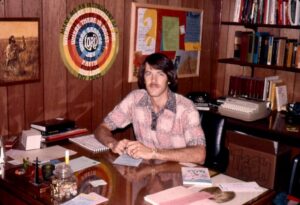 Fifty years ago this month, I moved to Austin, Texas and began my work as the youth minister at Woodlawn Baptist Church. As a recent graduate from seminary, I was eager to get to work in my first full-time position in church ministry.
Fifty years ago this month, I moved to Austin, Texas and began my work as the youth minister at Woodlawn Baptist Church. As a recent graduate from seminary, I was eager to get to work in my first full-time position in church ministry.
I knew I was facing some challenges. Woodlawn was a larger church with a much larger youth group than I had ever worked with, and it was also a church and a youth group shaped by tragedy. Just 16 months earlier, 19 teenagers and adults had been killed in a bus accident.
Every person in the church had been profoundly affected by the tragedy. Many of the youth I worked with had been either on the bus involved in the accident, or on a second bus and served as first responders to those killed or injured. Many of the teenagers were still recovering from physical injuries when I arrived. Every one of them was recovering from emotional injuries.
None of us on staff knew quite what we needed to do with all that grief and trauma. I certainly didn’t. The prevailing wisdom of that time was to ignore the details of the tragedy but do the best we could to support those who were affected. What I did as the youth minister, along with parents, teachers, and others who supported the youth, was to huddle us all together as much and as often as we could, to sing, study, pray, have fun, and be serious together.
I learned some important lessons from that experience. Most of all, none of us should be alone in the journey. We need help carrying our grief and trauma. Sadness and confusion need a safe place to come out, they need safe company. I’m glad we were safe company for one another.
Woodlawn was my first (and only) full-time youth ministry job. The church provided me, a 24-year-old kid when I arrived, with on-the-job training. After my second year on staff, I was asked to take over the music program as well, which included an adult choir, a youth choir, and planning and conducting the music for Sunday worship. I had no training for that. I was in over my head, lacking the knowledge, experience, or wisdom to manage it all. I worked with choirs and musicians who gave me lots of support and taught me how to do the job at least well enough to keep my head above water.
After four years I knew I was to go in a different direction in my life. I resigned, entered graduate school, and earned a doctorate in counseling psychology. I spent the next 23 years working at a university counseling center. Not surprisingly, my specialty became grief and trauma. I worked with thousands of undergraduate and graduate students, many who had experienced recent trauma or significant loss. I am indebted to all the folks at Woodlawn for helping me find that focus and for instilling in me a sensitivity I might not have had otherwise. Those university students were beneficiaries of much of what my youth ministry experience taught me.
I wish I had known while at Woodlawn what I subsequently learned in my psychology training, but that was then. We use what we have at the time. I trust that what I did then was enough for that time.
0 Comments until now
Add your Comment!